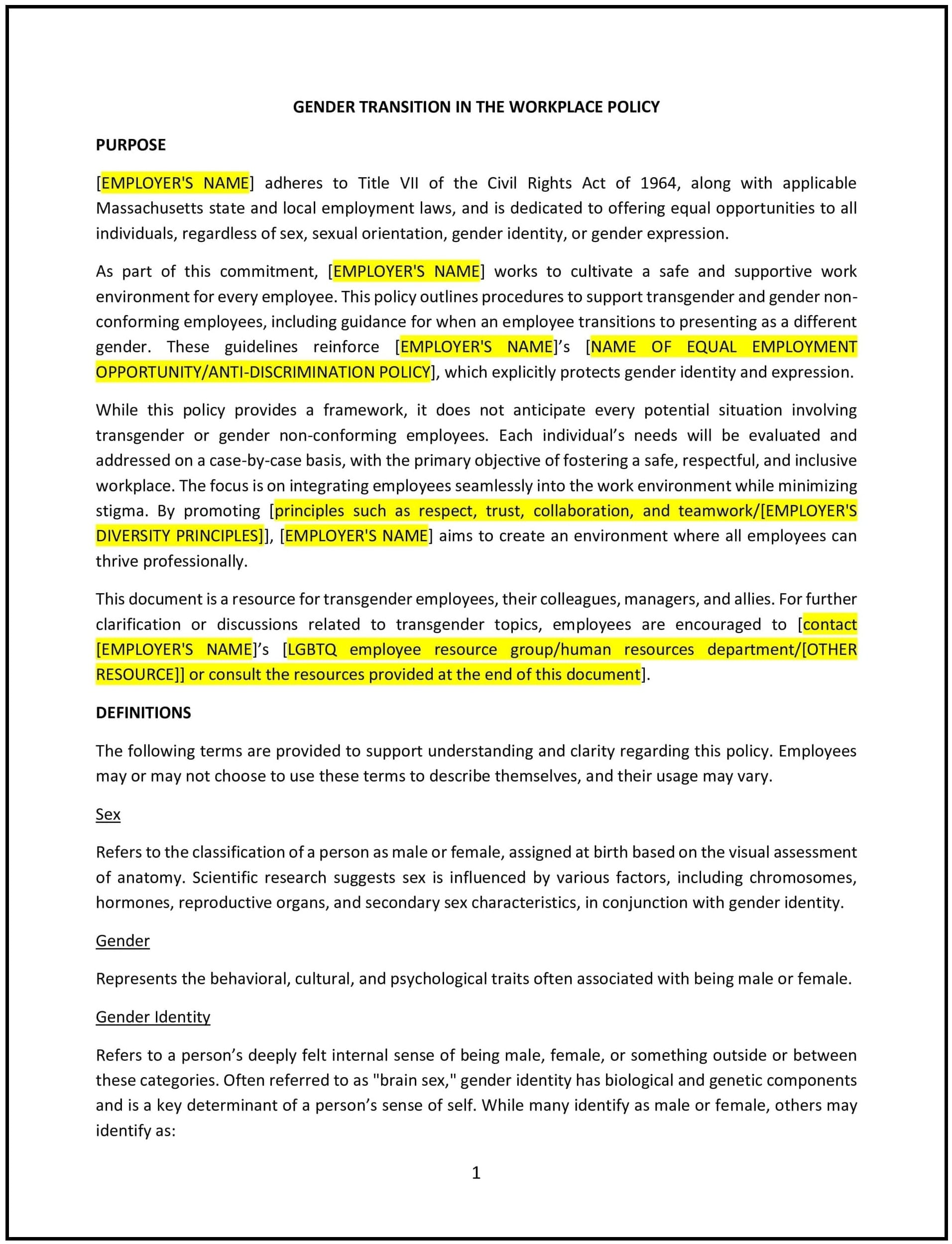Gender transition in the workplace policy (Massachusetts): Free template
Got contracts to review? While you're here for policies, let Cobrief make contract review effortless—start your free review now.

Customize this template for free
This gender transition in the workplace policy is designed to help Massachusetts businesses create an inclusive and supportive environment for employees who are transitioning or planning to transition in their gender identity. The policy outlines the steps the company will take to support employees during their gender transition, including confidentiality, accommodations, communication guidelines, and workplace adjustments. It emphasizes the company’s commitment to diversity, inclusion, and equal treatment for all employees, regardless of gender identity.
By adopting this policy, businesses can demonstrate their commitment to creating an inclusive workplace where employees feel safe, respected, and supported throughout their transition.
How to use this gender transition in the workplace policy (Massachusetts)
- Define the purpose and scope: Clearly outline the purpose of the policy, which is to create a supportive and inclusive environment for employees undergoing gender transition. The policy should apply to all employees and cover various aspects of the workplace, including dress code, name and pronoun usage, and bathroom access.
- Establish confidentiality guidelines: Specify how the company will handle sensitive personal information related to an employee’s gender transition. The policy should ensure that information regarding an employee’s transition is kept confidential and only shared with relevant personnel on a need-to-know basis.
- Provide for name and pronoun usage: Outline the company’s expectations for employees and management to respect and use the correct name and pronouns for employees who are transitioning. This includes providing training on gender-inclusive language and promoting an environment of respect and understanding.
- Address workplace accommodations: Specify the types of accommodations that may be available to employees during their gender transition, such as changes to dress code, restroom facilities, or flexible scheduling. The policy should ensure that all accommodations are provided in a manner that respects the employee’s dignity and comfort.
- Support communication and education: Provide guidelines for communication during the transition process, including informing colleagues, clients, and external contacts about the employee’s transition when appropriate. The policy should also encourage ongoing education and training on gender diversity and inclusion for all employees.
- Ensure equal treatment: Reaffirm the company’s commitment to treating all employees fairly and equitably, regardless of their gender identity. The policy should prohibit discrimination or harassment based on gender identity or gender expression and outline the steps for addressing any complaints of discrimination.
- Comply with Massachusetts and federal laws: Ensure that the policy complies with Massachusetts state laws, such as the Massachusetts Public Accommodations Law, as well as federal laws, including Title VII of the Civil Rights Act of 1964, which prohibits discrimination based on gender identity.
Benefits of using this gender transition in the workplace policy (Massachusetts)
This policy offers several benefits for Massachusetts businesses:
- Fosters an inclusive workplace: By providing clear guidelines and support for gender transition, businesses create an inclusive environment where all employees feel valued and respected, regardless of their gender identity.
- Promotes employee well-being: Supporting employees during their gender transition helps reduce stress and anxiety, promoting better mental health, job satisfaction, and overall well-being.
- Enhances employee retention: By offering a supportive and inclusive environment, businesses are more likely to retain employees who feel respected and comfortable in the workplace.
- Reduces legal risks: By ensuring compliance with Massachusetts state laws and federal anti-discrimination regulations, businesses can reduce the risk of discrimination claims or lawsuits related to gender identity.
- Improves company reputation: Companies that are known for their commitment to diversity and inclusion attract top talent, improve employee morale, and enhance their reputation in the community and among potential clients and customers.
- Increases productivity: When employees feel comfortable and supported, they are more likely to be engaged, focused, and productive in their roles.
Tips for using this gender transition in the workplace policy (Massachusetts)
- Communicate the policy clearly: Ensure that all employees are aware of the gender transition policy and understand their rights and responsibilities. This can be done through employee handbooks, training sessions, and regular internal communications.
- Provide training on gender inclusivity: Offer regular training on gender inclusivity, including the importance of using the correct pronouns, understanding gender identity and expression, and fostering an environment of respect and acceptance.
- Monitor implementation: Regularly assess how the policy is being implemented and whether employees are experiencing a supportive environment during gender transitions. Solicit feedback from employees to identify areas for improvement.
- Offer individualized support: Each employee’s transition may require different accommodations or support, so ensure that employees are encouraged to discuss their specific needs with HR in a confidential and respectful manner.
- Maintain flexibility: Be open to adjusting the policy and accommodations as needed to meet the evolving needs of employees who are transitioning. Encourage a culture of continuous learning and adaptation.
- Review and update regularly: Periodically review the policy to ensure it is compliant with Massachusetts state laws, federal regulations, and the company’s evolving diversity and inclusion goals.